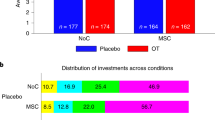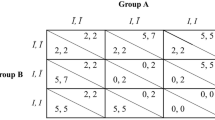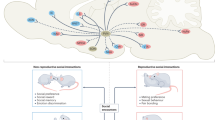Abstract
Trust pervades human societies1,2. Trust is indispensable in friendship, love, families and organizations, and plays a key role in economic exchange and politics3. In the absence of trust among trading partners, market transactions break down. In the absence of trust in a country's institutions and leaders, political legitimacy breaks down. Much recent evidence indicates that trust contributes to economic, political and social success4,5. Little is known, however, about the biological basis of trust among humans. Here we show that intranasal administration of oxytocin, a neuropeptide that plays a key role in social attachment and affiliation in non-human mammals6,7,8, causes a substantial increase in trust among humans, thereby greatly increasing the benefits from social interactions. We also show that the effect of oxytocin on trust is not due to a general increase in the readiness to bear risks. On the contrary, oxytocin specifically affects an individual's willingness to accept social risks arising through interpersonal interactions. These results concur with animal research suggesting an essential role for oxytocin as a biological basis of prosocial approach behaviour.
This is a preview of subscription content, access via your institution
Access options
Subscribe to this journal
Receive 51 print issues and online access
$199.00 per year
only $3.90 per issue
Buy this article
- Purchase on Springer Link
- Instant access to full article PDF
Prices may be subject to local taxes which are calculated during checkout



Similar content being viewed by others
References
Luhmann, N. Trust and Power (Wiley, New York, 1979)
Coleman, J. Foundations of Social Theory 91–118 (Belknap Press of Harvard Univ. Press, Cambridge, 1990)
Arrow, K. Gifts and exchanges. Phil. Publ. Affairs 1, 343–362 (1972)
Knack, S. & Keefer, P. Does social capital have an economic payoff? A cross-country investigation. Q. J. Econ. 112, 1251–1288 (1997)
Zak, P. J. & Knack, S. Trust and growth. Econ. J. 111, 295–321 (2001)
Carter, C. S. Neuroendocrine perspectives on social attachment and love. Psychoneuroendocrinology 23, 779–818 (1998)
Uvnas-Moberg, K. Oxytocin may mediate the benefits of positive social interaction and emotions. Psychoneuroendocrinology 23, 819–835 (1998)
Insel, T. R. & Young, L. J. The neurobiology of attachment. Nature Rev. Neurosci. 2, 129–136 (2001)
Landgraf, R. & Neumann, I. D. Vasopressin and oxytocin release within the brain: a dynamic concept of multiple and variable modes of neuropeptide communication. Front. Neuroendocrinol. 25, 150–176 (2004)
Huber, D., Pierre, V. & Ron, S. Vasopressin and oxytocin excite distinct neuronal populations in the central amygdala. Science 308, 245–248 (2005)
Carter, C. S., Altemus, M. & Chrousos, G. P. Neuroendocrine and emotional changes in the post-partum period. Prog. Brain Res. 133, 241–249 (2001)
Young, L. J., Lim, M. M., Gingrich, B. & Insel, T. R. Cellular mechanisms of social attachment. Horm. Behav. 40, 133–138 (2001)
Pedersen, C. A. Oxytocin control of maternal behavior. Regulation by sex steroids and offspring stimuli. Ann. NY Acad. Sci. 807, 126–145 (1997)
Heinrichs, M., Neumann, I. & Ehlert, U. Lactation and stress: protective effects of breast-feeding in humans. Stress 5, 195–203 (2002)
Insel, T. R. & Shapiro, L. E. Oxytocin receptor distribution reflects social organization in monogamous and polygamous voles. Proc. Natl Acad. Sci. USA 89, 5981–5985 (1992)
Born, J. et al. Sniffing neuropeptides: a transnasal approach to the human brain. Nature Neurosci. 5, 514–516 (2002)
Heinrichs, M., Baumgartner, T., Kirschbaum, C. & Ehlert, U. Social support and oxytocin interact to suppress cortisol and subjective responses to psychosocial stress. Biol. Psychiatry 54, 1389–1398 (2003)
Heinrichs, M., Meinlschmidt, G., Wippich, W., Ehlert, U. & Hellhammer, D. H. Selective amnesic effects of oxytocin on human memory. Physiol. Behav. 83, 31–38 (2004)
Camerer, C. & Weigelt, K. Experimental tests of a sequential equilibrium reputation model. Econometrica 56, 1–36 (1988)
Fehr, E., Kirchsteiger, G. & Riedl, A. Does fairness prevent market clearing? An experimental investigation. Q. J. Econ. 108, 437–459 (1993)
Berg, J., Dickhaut, J. & McCabe, K. Trust, reciprocity and social history. Games Econ. Behav. 10, 122–142 (1995)
Bohnet, I. & Zeckhauser, R. Trust, risk and betrayal. J. Econ. Behav. Organ. 55, 467–484 (2004)
Holt, C. & Laury, S. Risk aversion and incentive effects. Am. Econ. Rev. 92, 1644–1655 (2002)
Fehr, E. & Schmidt, K. M. A theory of fairness, competition, and cooperation. Q. J. Econ. 114, 817–868 (1999)
Hong, K. & Bohnet, I. Status and Distrust: the Relevance of Inequality and Betrayal Aversion (Working Paper RW04-041, Kennedy School, Harvard Univ., Cambridge, 2004)
Steyer, R., Schwenkmezger, P., Notz, P. & Eid, M. Der Mehrdimensionale Befindlichkeitsfragebogen (MDBF) [Multidimensional mood questionnaire] (Hogrefe, Göttingen, 1997)
Gintis, H., Bowles, S., Boyd, R. & Fehr, E. Explaining altruistic behavior in humans. Evol. Hum. Behav. 24, 153–172 (2003)
Engelmann, D. & Strobel, M. Inequality aversion, efficiency, and maximin preferences in simple distribution experiments. Am. Econ. Rev. 94, 857–869 (2004)
Kendrick, K. M. et al. Neural control of maternal behaviour and olfactory recognition of offspring. Brain Res. Bull. 44, 383–395 (1997)
Fischbacher, U. z-Tree. Zurich Toolbox for Readymade Economic Experiments (Working Paper No. 21, Institute for Empirical Research in Economics, Univ., Zurich, 1999)
Acknowledgements
This paper is part of the Research Priority Program ‘Foundations of Human Social Behaviour—Altruism versus Egoism’ at the University of Zurich. Financial support from the MacArthur Foundation (Network on Economic Environments and the Evolution of Individual Preferences and Social Norms) and the Cogito Foundation is gratefully acknowledged. M.H. also acknowledges support from the Swiss National Science Foundation. We thank F. Heusi, A. Enzler, S. Gilomen, E. Götz, M. Koenigsberg, K. Korsunsky, S. Krammer, S. Lauber, P. Obrist-Rybar, M. Schellhammer, B. Studer, R. Stünzi and M. Trottmann for research assistance.
Author information
Authors and Affiliations
Corresponding authors
Ethics declarations
Competing interests
Reprints and permissions information is available at npg.nature.com/reprintsandpermissions. The authors declare no competing financial interests.
Rights and permissions
About this article
Cite this article
Kosfeld, M., Heinrichs, M., Zak, P. et al. Oxytocin increases trust in humans. Nature 435, 673–676 (2005). https://doi.org/10.1038/nature03701
Received:
Accepted:
Issue Date:
DOI: https://doi.org/10.1038/nature03701
This article is cited by
-
Alarm or emotion? intranasal oxytocin helps determine information conveyed by dog barks for adult male human listeners
BMC Ecology and Evolution (2024)
-
Bullying fosters interpersonal distrust and degrades adolescent mental health as predicted by Social Safety Theory
Nature Mental Health (2024)
-
Do Wealth Managers Understand Codes of Conduct and Their Ethical Dilemmas? Lessons from an Online Survey
Journal of Business Ethics (2024)
-
What (if anything) morally separates environmental from neurochemical behavioral interventions?
Neuroethics (2024)
-
Alcohol does not influence trust in others or oxytocin, but increases positive affect and risk-taking: a randomized, controlled, within-subject trial
European Archives of Psychiatry and Clinical Neuroscience (2024)
Comments
By submitting a comment you agree to abide by our Terms and Community Guidelines. If you find something abusive or that does not comply with our terms or guidelines please flag it as inappropriate.



